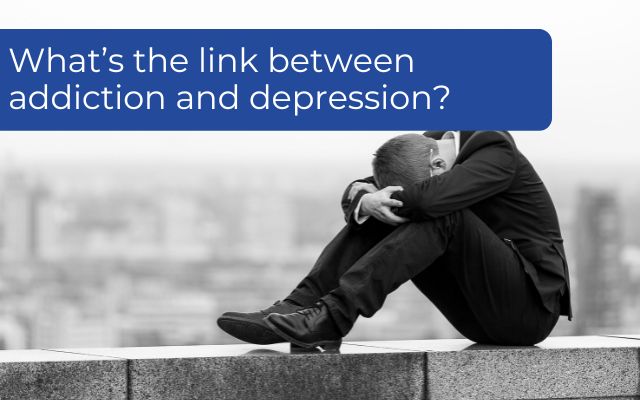Recovering from addiction is difficult but dealing with another mental health condition at the same time is even harder, but the two needed to be treated together for the best chances to recover from both, if you’re here because you want to learn more about the link between addiction and depression, you’re in the right place.
When addiction occurs alongside other mental illnesses, which occurs often, it is termed dual diagnosis.
The link between mental illness and addiction goes both ways. About 50% of people with a severe mental illness are also affected by a substance problem. Moreover, roughly 37% of alcohol abusers and 53% of drug abusers have at least one other serious mental illness.
Although statistics for South Africa are not available, in the United States it is estimated that 69% of all the nation’s alcohol and 84% of all the cocaine used in that country is consumed by people who have been diagnosed with another mental illness in their lifetime.
A common mental health condition that occurs in people with addiction and alcoholism is depression.

What is depression?
Depression is the most common mental illness in the world. Most people will feel depressed at some point in their lives but when it is persistent and severe it becomes a diagnosable mental illness called major depressive disorder or clinical depression.
According to the World Health Organisation, roughly five percent of adults globally suffer from depression.
Depression is defined as “a mood disorder that causes a persistent feeling of sadness and loss of interest”. Common symptoms include:
- Feelings of sadness, hopelessness and emptiness
- Tearfulness or crying
- Irritability and angry outbursts
- Loss of interest or pleasure in once enjoyable activities like sex, hobbies or sports
- Sleeping too much or too little
- Fatigue and lack of energy
- Reduced or increased appetite and related weight loss or weight gain
- Anxiety
- Feelings of worthlessness
- Difficulties with thinking and memory
- Thoughts of death or suicide and suicide attempts
Most people with depression lose the ability to fully participate in life’s day-to-day activities.
Depression can be triggered or caused by a number of reasons including substance abuse, genetics, trauma and medical illnesses. But often, the exact cause will remain elusive.
What is the link between depression and addiction or alcoholism?
There is a strong link between depression and addiction. Roughly one third of people with an addiction also suffer from depression. Depression places a person at a higher risk for developing an addiction and vice versa. About 16.5% of people with depression are addicted to alcohol and roughly 18% have a drug addiction.
People with depression often seek relief from painful thoughts and feelings by using drugs and alcohol. But this kind of self-medicating often ends up making a person’s depression worse in the long-run.
People with addiction often begin to feel depressed from intoxication, withdrawal and/or from the consequences experienced as a result of their substance abuse.
People suffering from depression have an estimated 10% lifetime risk of suicide. But people with depression and alcohol or drug addiction have a 25% lifetime suicide risk.
It has been found that teenagers who have attempted suicide or more likely to have used marijuana than those who have not attempted suicide.
Treating addiction and depression
In a person with addiction and depression both conditions need to be treated simultaneously. Treating addiction alone can lead to a person relapsing on drugs or alcohol due to unresolved symptoms of depression. Untreated depression can also lead to a person failing to complete addiction treatment and dropping out early. Treating depression alone is often unsuccessful as continued substance abuse could cause depressive symptoms to persist despite treatment. Additionally, heavy alcohol use has been found to reduce the efficacy of antidepressant medication.
This is one of the reasons why addiction treatment centres should employ experienced psychologists and psychiatrists.
Treatment should include a combination of medication and therapy.
It is often difficult to differentiate between depression and routine signs of addiction as symptoms overlap. For example, both depression and addiction can cause a person to give up on social activities or hobbies, experience problems with relationships and isolate themselves from other people.
Quitting drugs and alcohol can lead to short-term depression or the worsening of symptoms of existing major depressive disorder that may resolve or improve after a longer period of abstinence.
This is another reason addiction treatment should employ specialised mental health professionals as well as make sure a client’s mental health is assessed for a period after completing rehab.
For example, research that followed up methamphetamine users with depression for three years found that those who abstained from the drug experienced significant declines in their symptoms of depression compared to those who continued to use.
According to the US-based Substance Abuse and Mental Health Services Administration, good dual diagnosis treatment will provide therapy for depression that:
- Helps the client understand the nature of depression
- Advises the client that it is possible to recover from both addiction and depression
- Inspires clients to change their lives
- Provides clients with skills and strategies to deal with negative thinking patterns
- Helps clients identify and change addictive behavioural patterns
Are you looking for a rehab experienced in treating dual diagnosis (including addiction or alcoholism and depression)? Contact Changes Rehab today.